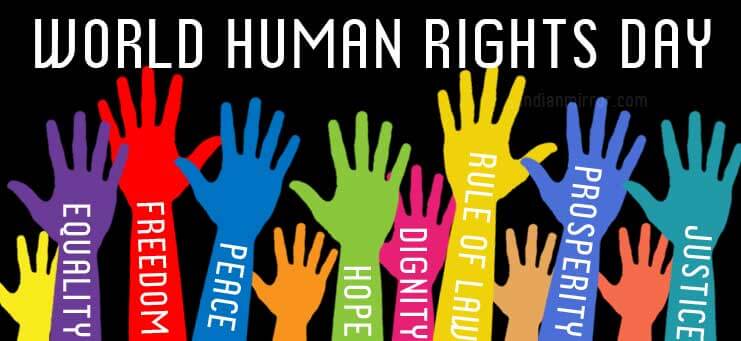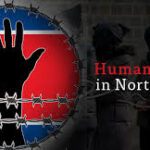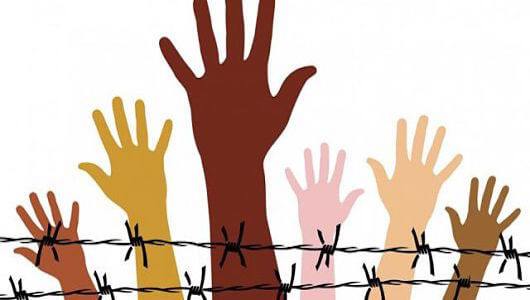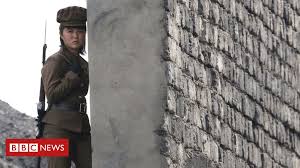
Human Rights Violations, Deception, and Nuclear Weapons: The Pillars of Kim Regime Survival https://www.hrnkinsider.org/2020/12/human-rights-violations-deception-and.html
Posted by Committee for Human Rights in North Korea with No comments
The North Korean Regime Denies Its Population Fundamental Human Rights and Deceives the World with Fake Human Rights Propaganda
(An Essay Marking the 72nd anniversary of the adoption of the Universal Declaration of Human Rights)
By Kim Myong, HRNK Contributor
Edited by Greg Scarlatoiu, HRNK Executive Director

In 1948, the year when a dictatorship was established in North Korea to serve one-man rule by the Kim family, humanity witnessed the proclamation of a landmark document, the Universal Declaration of Human Rights, which aimed to end slavery and promote respect for the fundamental rights, freedoms, and equality of all people and nations.[1]
The Universal Declaration of Human Rights was founded on the common understanding of the international community that human rights are the basis of justice and peace, and that the respect and promotion of human dignity and rights should be placed at the center of all the endeavors by member states of the then three-year-old United Nations, in order to maintain international peace and security, and to develop friendly relations and cooperation among nations.
Although the Declaration had no legal binding power, it became the most translated United Nations document that is available in more than 550 languages and dialects today. Furthermore, it formed the basis for all the human rights treaties and instruments of the United Nations.
“All human beings are born free and equal in dignity and rights.”
Starting from Article 1, recognizing fundamental human rights to freedom and equality, the Declaration contains 30 articles covering freedoms and basic rights that human beings should be guaranteed not only as individuals, but also as citizens, in all areas of human life, including politics, economics, society, and culture.
It has a very special meaning to me, who was born in North Korea, known as a living hell and human rights wasteland, to spend most of my lifespan there without realizing what my rights were.
I feel deeply compassionate for my fellow countrymen in the North, who are still suffering from the tyranny and oppression of dictator Kim Jong-un under the glorified “people-centered” regime. And my heart pounds faster, filled with hatred for the Kim family and a handful of North Korea’s ruling group, who have degraded their population into slavery, to reign above the law, enjoying absolute power and wealth.
There will be no regime on this planet that says they neglect the dignity and rights of their people. That’s because in modern times, the international community brands such regimes as the most savage and does not allow them the space to exist on Earth.
The fact that the United Nations, which had only 58 members at the time the Universal Declaration of Human Rights was adopted, has grown to become the world’s largest intergovernmental organization with 193 member states today, and that the vast majority of them have acceded to major international human rights instruments, reflects this reality (see Figure 1).
Figure 1: Ratification status of the key United Nations Human Rights Treaties among 193 members as of December 3, 2020 (Unit: Percentage)

Source: Official database of the United Nations Treaty Collection, Status of Treaties, available at:https://treaties.un.org/Pages/Treaties.aspx?id=4&subid=A&clang=_en
However, a country cannot appraise itself as a human rights advocate just because it has acceded to any of the international human rights instruments and reflected their spirit in the national constitution or laws. Freedoms and rights are not simply meant to exist on paper only. They are to be implemented, exercised, enforced, protected, and lived in real life.
North Korea’s Songbun Degrades Its Population into Modern Slavery with All Serving the Regime’s Master[2]
“No one shall be held in slavery or servitude; slavery and the slave trade shall be prohibited in all their forms.”
– Article 4 of the Universal Declaration of Human Rights –
Every human being is entitled to all rights and freedoms without distinction of any kind, such as race, color, gender, language, religion, political opinion, ethnic or social origin, property, or other status. The approach, based on equal entitlement to rights and freedoms at birth, is a prerequisite to effectively guaranteeing human rights and freedoms to everyone.
Kim Il-sung, revered as the founder of modern North Korea, named his country the Democratic People’s Republic of Korea. By doing so, he wrapped his product up in colorful words, such as democracy and people, as if this were a people-centered democratic republic based on the separation of powers. In addition, Article 8 of North Korea’s Constitution states that its social system is people-centered, and the working people are the masters of all things, while everything in society serves them.
However, the so-called Democratic People’s Republic of Korea, which I experienced in real life from my parents’ generation, has never been democratic or people-centered. This country is literally the most repressive modern slave state in the world, where 25 million slaves live under various rankings and levels of oppression. Their only Master is the Kim family.
North Koreans come into the world with the status of slaves bound to their Master and deprived of human dignity, freedom and rights, and they are destined to serve their Master until the end of their lives. On the contrary, any member of the Kim family is enjoying a privileged fate as Master of millions of slaves during their lifetime and from one generation to the next.
The modern slavery system in North Korea is maintained through Songbun (the social classification system), somehow similar to the caste system in India. Songbun divides people into different classes using a set of criteria, including loyalty to the Master, and creates inequality of opportunities among all people, as a means of inducing their loyalty to the Master.[3] All North Koreans, upon their birth, inherit a Songbun classification from their parents, and it is almost impossible to change it once it is assigned. They are bound to live a life predetermined by their individual Songbun.
Reality in North Korea shows that if someone has “good” parents, he or she is given access to opportunities for better food, education, employment, health care, and pretty much everything else. On the contrary, if someone has “bad” parents, he or she is denied the same access to opportunities.
On the hierarchical class ladder that exists in North Korea, there is barely any ascension in class status, but decline is often swift. In other words, the family of a coal miner is destined to work in coal mines from generation to generation, and those born from a family branded as “traitor to the nation,” “enemy of the state,” or “enemy of the people” cannot erase this stigma until they die, even if they worked hard for the Kim family for their entire lifetime. On the other hand, even if someone starts his or her career with relatively good Songbun, he or she risks a decline in status if a “mistake” is made, or even if the person is just suspected of having made a “mistake.”
North Korean propaganda brands its system as a “Community of Common Destiny” in which the leader and the people are united, but this is nothing more than lip service to hide the existing Master-slave relationship.
The Destiny of 25 Million Individuals is Overshadowed by the Great Leader’s “Supreme Dignity”In North Korea, which has remained a dictatorship centered on one man’s absolute power for the past seven and half decades, there only exists the “supreme dignity” of the great leader, who is idolized to the level of God, at the expense of all individuals’ dignity.
The “supreme dignity” of the great leader is inviolable and immortal.
The thoughts and words of the great leader become national policies and guidelines that should be implemented by the whole country and the people. Each and every action by the leader becomes a model to follow.
If anyone disagrees or challenges the “supreme dignity” in one way or another, this is considered a felony. The person under suspicion is immediately accused of anti-party and counter-revolutionary attitudes or activities.
The great leader approves and makes decisions on every national matter, but never takes responsibility for failures. If things go well, this is the result of his wise leadership, but if things go wrong, this is the result of some “anti-party and counter-revolutionary” elements who infiltrated the revolutionary units.
These are two typical examples among many others: (1) When 3 million people starved to death in the mid-1990s during the “Arduous March”, So Gwan-hee, the secretary in charge of agriculture in the Korean Workers’ Party, was executed for “spying for the Americans” and “failing to implement the Party’s agricultural policy guidelines”; and (2) Following the abysmal failure of the currency reform carried out in late 2009, Pak Nam-ki, secretary in charge of economic planning in the Korean Workers’ Party, was executed as a “traitor to the nation.”
At the time, the North Korean people who were mobilized to witness these executions and those who were unofficially debriefed by witnesses were petrified by the hypocrisy and cruelty of the Kim family.
The great leader and his family monopolize all the precious wealth and resources available in the country as a result of the blood, sweat, and tears of the working population. The great leader and his family are the only ones who can enjoy all conceivable freedoms, rights, and a super-luxurious life. In sharp and dark contrast, the average North Korean works hard 365 days a year and gets nothing in return.
Indeed, everything happening in North Korea, the way its oppressive system works, is in and by itself a perpetual chain of human rights violations.
Escaping North Korea is a Fundamental Human Right, Not TreasonNorth Korea is the worst human rights abuser in the 21st century. They trample upon the dignity, values, freedoms, and rights of the people in order to eternally preserve the hereditary dictatorship of the Kim family.
As such, it is fairly natural for the people to escape this living hell and resettle in the Free World in search of human dignity, freedom, and new life.
The international community has confirmed that the North Koreans who escaped from the country for fear of political persecution, because of human rights violations and economic hardship, are refugees in accordance with the United Nations Convention and Protocol Relating to the Status of Refugees, and requested all governments to accept and protect them.[4]But, the Kim family, who has ruled the country for so long just to fail to feed the people, is blaming the escapees and labeling them as “traitors” and “scumbags,” instead of making apologies. This is another anti-human and wicked act that shall forever live in infamy.
Still, many North Korean escapees who could not join the Free World go through tremendous hardships in China and its neighboring countries, with no official identity or legal status. Extremely vulnerable, they are subjected to human trafficking, kidnapping, and sexual exploitation. If caught by the local police, they are forcibly repatriated to North Korea’s Kim regime to be tortured, imprisoned, and even sentenced to death.
Many of those who have succeeded in resettling in the Free World have managed to upgrade their status to work as doctors, professors, businessmen, or members of the South Korean National Assembly. They were not even treated as human beings in the human rights wasteland of North Korea.
No matter how harshly the North Korean regime criticizes and blames them, they are convinced that they have made a good decision by abandoning the hellish North Korean system and joining the Free World.
Words uttered by a free human being should count. Words uttered by North Korean escapees must count.
The Kim family and the North Korean regime have no right to blame the escapees, as they are the ones who are forcing their countrymen to be separated from their beloved family members, relatives, and close friends and to leave their home country for a new place to live. Before cursing anyone else, they should first look back and reflect on their own human rights situation and try to fix it as soon as possible.Human Rights Violations in North Korea Must Stop ImmediatelyHuman rights violations are a tool of survival for the Kim family. Human rights violations safeguard their supreme privilege and secure their hereditary rule. Human rights violations, human rights deception, and nuclear weapons constitute the pillars of regime survival, supporting the Kim family’s long-standing dictatorship in North Korea.
The situation of human rights abuses and violations by the North Korean regime was spotlighted on the international stage after North Korea was admitted to the United Nations in 1991.
Despite its attempt to remain hidden behind the disguise of a “normal state” after its admission to the United Nations, North Korea has failed so far to erase its well-deserved stigma as the world’s most repressive state.
In order to disguise itself as a human rights advocate, North Korea showed symbolic gestures by subscribing to a few international human rights conventions and sporadically submitting some implementation of reports thereof (see Annex 1).
However, as the Russian proverb has it, “you can’t hide an awl in a bag.” Or, as the Gospel of Luke 8:17 puts it, “For there is nothing secret that would not be revealed, nor hidden, that would not become known and would not be revealed.”
The international community has been condemning in the strongest terms the systematic, widespread, and gross crimes against humanity committed by the North Korean regime, urging North Korea’s leadership to improve the human rights situation, at regular annual meetings of the United Nations Human Rights Council as well as the General Assembly and its Third Committee (see Annex 2).
The 2014 Report of the United Nations Commission of Inquiry on Human Rights in the Democratic People’s Republic of Korea is a landmark document, which exposed to the world human rights abuses and violations as well as crimes against humanity committed systematically and consistently over a long period of time by the North Korean regime. The report was based on direct statements from victims and witnesses, and on an investigation conducted by renowned international experts.[5]
In the earlier days of the adoption of North Korea human rights resolutions, many countries opposed or abstained in consideration of bilateral relations with North Korea. However, as time went on, more and more countries changed their position, favoring the resolutions. For the past few years, the resolutions were adopted by consensus (see Figure 2).
Figure 2: Adoption status of the resolutions on the human rights situation in North Korea in the United Nations General Assembly, 2005–2019 (Unit: Number of votes)

Source: Official database of the United Nations General Assembly resolutions, available at: https://www.un.org/en/sections/documents/general-assembly-resolutions/index.html
However, the North Korean government continues to ignore the repeated requests of the international community and the recommendations to improve the country’s human rights situation.
Human rights constitute a universal value, regardless of the nature of one’s social system.
The requests of the international community are not an “attempt of hostile forces to destroy the ideological position and stifle the regime of the Republic”, as North Korea claims. Rather, the requests reflect the unanimous voice of all nations. As far as the citizens of South Korea are concerned, “the people in North Korea are not just ‘anybody’ to us,” as a South Korean ambassador once said at a United Nations Security Council meeting.
No regime or political system can survive without ultimately guaranteeing the basic rights to life and subsistence to each and every citizen. Any regime that governs its people through tyranny, by force of arms and fear, cannot last forever, and will be doomed to failure.
The North Korean regime must respect the Universal Declaration of Human Rights and other international human rights treaties as demanded by the nations of the world. The North Korean regime must engage with the United Nations and the international community to improve the dire human rights situation without delay.
Annex 1: Accession of North Korea to the United Nations Human Rights Treaties and their Optional Protocols
| Name of treaties/optional protocols | Signature | Ratification | Implementation report submission |
| International Convention on the Elimination of All Forms of Racial Discrimination (CERD, 1966) | … | … | … |
| International Covenant on Economic, Social and Cultural Rights (CESCR, 1966) | … | 9/14/1981 | 1984, 2002 |
| Optional Protocol (2008) | … | … | … |
| International Covenant on Civil and Political Rights (CCPR, 1966) | … | 9/14/1981 | 1984, 2000 |
| Optional Protocol (1966, providing for a right to individual petition) | … | … | … |
| Second Optional Protocol (CCPR-OP2-DP, 1989, promoting the abolition of the death penalty) | … | … | … |
| Convention on the Elimination of All Forms of Discrimination against Women (CEDAW, 1979) | … | 2/27/2001 | 2002, 2016 |
| Optional Protocol (1999) | … | … | … |
| Convention against Torture and Other Cruel, Inhuman or Degrading Treatment or Punishment (CAT, 1984) | … | … | … |
| Optional Protocol (CAT-OP, 2002) | … | … | … |
| Convention on the Rights of the Child (CRC, 1989) | 8/23/1990 | 9/21/1990 | 1996, 2002, 2007, 2016 |
| Optional Protocol on the involvement of children in armed conflict (CRC-OP-AC, 2000) | … | … | … |
| Optional Protocol on the sale of children, child prostitution and child pornography (CRC-OP-SC, 2000) | 9/9/2014 | 11/10/2014 | … |
| Optional Protocol on a communications procedure (2011) | … | … | … |
| International Convention on the Protection of the Rights of All Migrant Workers and Members of their Families (CMW, 1990) | … | … | … |
| Convention on the Rights of Persons with Disabilities (CRPD, 2006) | 7/3/2013 | 12/6/2016 | 2018 |
| Optional Protocol (2006) | … | … | … |
| International Convention for the Protection of All Persons from Enforced Disappearance (CED, 2006) | … | … | … |
Source: Official database of the United Nations Human Rights Treaty Bodies, available at: https://tbinternet.ohchr.org/_layouts/15/TreatyBodyExternal/Treaty.aspx?CountryID=47&Lang=EN
Annex 2: Resolutions adopted by the United Nations on the situation of human rights in North Korea
| Year | Resolution Code | Date of adoption | Organization | Modality of adoption |
| 2003 | E/CN.4/RES/2003/10 | 4/16/2003 | UN Commission on Human Rights | Vote: 28 in favor; 10 against; 14 abstentions |
| 2004 | E/CN.4/RES/2004/13 | 4/15/2004 | UN Commission on Human Rights | Vote: 29-8-16 |
| 2005 | E/CN.4/RES/2005/11 | 4/14/2005 | UN Commission on Human Rights | Vote: 13-9-14 |
| A/C.3/60/L.48 | 11/17/2005 | UN Third Committee | Vote: 84-22-62 | |
| A/RES/60/173 | 12/16/2005 | UN General Assembly | Vote: 88-21-60 | |
| 2006 | A/C.3/61/L.37 | 11/17/2006 | UN Third Committee | Vote: 91-21-60 |
| A/RES/61/174 | 12/19/2006 | UN General Assembly | Vote: 99-21-56 | |
| 2007 | A/C.3/62/L.37 | 11/20/2007 | UN Third Committee | Vote: 97-23-60 |
| A/RES/62/167 | 12/18/2007 | UN General Assembly | Vote: 101-22-59 | |
| 2008 | A/HRC/RES/7/15 | 3/27/2008 | UN Human Rights Council | Vote: 22-7-18 |
| A/C.3/63/L.26 | 11/21/2008 | UN Third Committee | Vote: 95-24-62 | |
| A/RES/63/190 | 12/18/2008 | UN General Assembly | Vote: 94-22-63 | |
| 2009 | A/HRC/RES/10/16 | 3/26/2009 | UN Human Rights Council | Vote: 26-6-15 |
| A/C.3/64/L.35 | 11/19/2009 | UN Third Committee | Vote: 97-19-65 | |
| A/RES/64/175 | 12/18/2009 | UN General Assembly | Vote: 99-20-63 | |
| 2010 | A/HRC/13/L.13 | 3/25/2010 | UN Human Rights Council | Vote: 28-5-13 |
| A/C.3/65/L.47 | 11/18/2010 | UN Third Committee | Vote: 100-18-60 | |
| A/RES/65/225 | 12/21/2010 | UN General Assembly | Vote: 106-20-57 | |
| 2011 | A/HRC/16/L.3 | 3/24/2011 | UN Human Rights Council | Vote: 30-3-11 |
| A/C.3/66/L.54 | 11/21/2011 | UN Third Committee | Vote: 112-16-55 | |
| A/RES/66/174 | 12/19/2011 | UN General Assembly | Vote: 123-16-51 | |
| 2012 | A/HRC/19/L.29 | 3/22/2012 | UN Human Rights Council | By consensus |
| A/C.3/67/L.50 | 11/27/2012 | UN Third Committee | By consensus | |
| A/RES/67/181 | 12/20/2012 | UN General Assembly | By consensus | |
| 2013 | A/HRC/22/L.19 | 3/21/2013 | UN Human Rights Council | By consensus |
| A/C.3/68/L.56 | 11/19/2013 | UN Third Committee | By consensus | |
| A/RES/68/183 | 12/18/2013 | UN General Assembly | By consensus | |
| 2014 | A/HRC/25/L.17 | 3/28/2014 | UN Human Rights Council | Vote: 30-6-11 |
| A/C.3/69/L.28 | 11/18/2014 | UN Third Committee | Vote: 111-19-55 | |
| A/RES/69/188 | 12/18/2014 | UN General Assembly | Vote: 116-20-53 | |
| 2015 | A/HRC/28/L.18 | 3/27/2015 | UN Human Rights Council | Vote: 27-6-14 |
| A/C.3/70/L.35 | 11/19/2015 | UN Third Committee | Vote: 112-19-50 | |
| A/RES/70/172 | 12/17/2015 | UN General Assembly | Vote: 119-19-48 | |
| 2016 | A/HRC/31/L.25 | 3/23/2016 | UN Human Rights Council | By consensus |
| A/C.3/71/L.23 | 11/15/2016 | UN Third Committee | By consensus | |
| A/RES/71/202 | 12/19/2016 | UN General Assembly | By consensus | |
| 2017 | A/HRC/34/L.23 | 3/24/2017 | UN Human Rights Council | By consensus |
| A/C.3/72/L.40 | 11/14/2017 | UN Third Committee | By consensus | |
| A/RES/72/188 | 12/19/2011 | UN General Assembly | By consensus | |
| 2018 | A/HRC/37/L.29 | 3/23/2018 | UN Human Rights Council | By consensus |
| A/C.3/73/L.40 | 11/15/2018 | UN Third Committee | By consensus | |
| A/RES/73/180 | 12/17/2018 | UN General Assembly | By consensus | |
| 2019 | A/HRC/40/L.18 | 3/22/2019 | UN Human Rights Council | By consensus |
| A/C.3/74/L.26 | 11/14/2019 | UN Third Committee | By consensus | |
| A/RES/74/166 | 12/18/2019 | UN General Assembly | By consensus | |
| 2020 | A/HRC/43/L.17 | 6/22/2020 | UN Human Rights Council | By consensus |
| A/C.3/75/L.30 | 11/18/2020 | UN Third Committee | By consensus | |
| … | … | … | … |
Source: Official database of the United Nations meetings, available at:
https://www.un.org/en/sections/documents/general-assembly-resolutions/index.html
https://www.un.org/en/ga/third/75/documentation.shtml
https://www.un.org/en/ga/third/archives.shtml
https://www.ohchr.org/EN/HRBodies/HRC/RegularSessions/Pages/RegularSessions.aspx
[1] The full text of the Universal Declaration of Human Rights and all the resources can be accessed from: https://www.ohchr.org/EN/UDHR/Pages/UDHRIndex.aspx
[2] Songbun is a unique “social classification” system in North Korea.
[3] Robert Collins (2010). “Marked for Life: Songbun – North Kore’s Social Classification System”, the Committee for Human Rights in North Korea, Washington DC, United States. Available at:
https://www.hrnk.org/uploads/pdfs/HRNK_Songbun_Web.pdf
[4] The Office of the United Nations High Commissioner for Refugees (UNHCR). The 1951 Refugee Convention and its 1967 Protocol relating to the Status of Refugees, available at:
https://www.unhcr.org/en-us/1951-refugee-convention.html
[5] Report of the Commission of Inquiry on Human Rights in the DPRK (A/HRC/25/63), available at:
https://www.ohchr.org/EN/HRBodies/HRC/CoIDPRK/Pages/ReportoftheCommissionofInquiryDPRK.aspx




